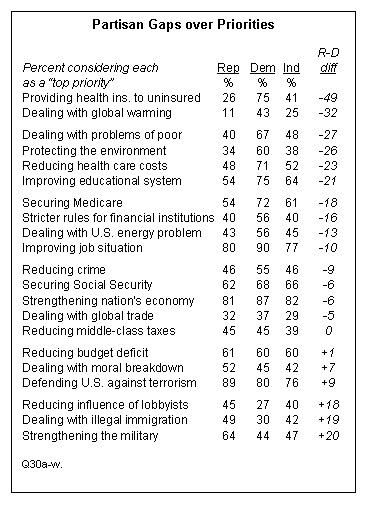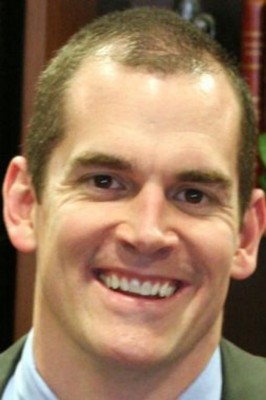
Greetings from NYC, post Sandy, but pre-election. I have been really busy this election season, so I haven’t had the time to cover this election or do as much reading as I would like. I have C-SPAN on now watching the last minute speeches by Romney, Obama, Ryan, and Biden and seeing a bit on punditry. I didn’t compile predictions like I did for 2008, but this time I’ll go into some detail on my swing state picks. Here’s a compilation I saw on my Twitter feed.
Here’s the electoral map that I started with. The 146 electorals in the swing states are beige, while Romney’s states are red and Obama’s are blue. The breakdown is 201 [Obama], 191 [Romney], 146 in play, and with 270 needed to win.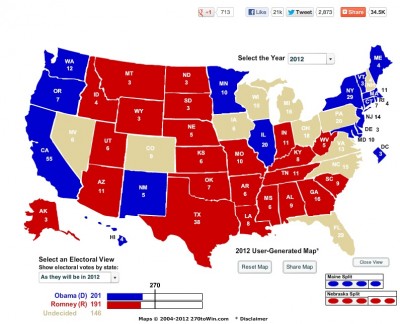
Florida [29] The polls show the momentum shifting towards Romney in the state. I think the post-mortems will find that the I-4 corridor decided the election and the Democratic hopes of winning the state hinge upon keeping it close here. I don’t know the “house effects” for Mason-Dixon, but their poll of the area for the Tampa Bay Times has Romney leading.
North Carolina [15] I don’t think North Carolina is in play. Obama wasn’t appearing there himself and while Bill Clinton was pitching for the cause with the likes of Mariah Carey, I think his campaign has conceded it to Romney. Romney’s campaign has signalled its confidence since mid-October. Unemployment is high in the state and it was a narrow Obama victory in 2008 which tends to vote Republican in Presidential races.
Pennsylvania [20] Romney made a recent push in Pennsylvania, including a $12M adspend, which may have raised some eyebrows. I think it’s “too big to ignore” and his people felt it was worth the stretch. Michael Barone of The National Review went out on a limb with Pennsylvania, citing Romney’s appeal specifically in the western part of the Keystone state and the Philadelphia suburbs. It could be close, as this article on Philly.com notes.
Michigan [16] Another bellwether and a must-win for Obama was a beneficiary of the 2009 auto bailouts. Democrats are expecting Debbie Stabenow to hold her US Senate seat and are hoping to pick up some House seats, including MI-1 in the upper peninsula (Bart Stupak’s [D] old seat). The tea party candidate, Dan Benishek, is facing a tough race in a district that benefits greatly from federal monies. I see blue as trending in the state.
Nevada [6] I don’t see Nevada as being in play, despite the sky high unemployment of 11.8%. Obama has focused on courting Hispanics and the union vote, while Romney has worked a ground game strategy in the Las Vegas suburbs.
Colorado [9] NBC has this at a dead heat and early voting is trending for Romney. Colorado tends to vote Republican and didn’t go for Clinton in 1996. I see the closeness of the race at this time being bad news for Obama’s fortunes in the state.
Iowa [6] I think Obama’s rhetoric in Iowa might be a tipoff. Unlike in Ohio, where he characterized Romney as “not one of us”, his messaging in Iowa was more hope & change. The northwest has Evangelical Christians who aren’t too excited about Mitt Romney so turnout is key there. Obama will need to do well in the cities along I-80 to pull off Iowa.
Wisconsin [10] I see Wisconsin as a schizophrenic state. The trend has been towards Democrats in the presidency, but Republicans are a force at the state level and one of the US Senate seats and 5 of 8 House seats. The polls have Obama in the lead and my take is that despite Ryan on the ticket, this will hold.
This brings us to a 259 to 244 tally with Obama leading Romney with 35 electorals in play.
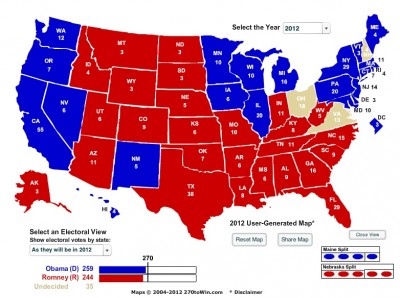
I see the following states as the swingingest of the swing states. These are varying shades of “purple” in my book (between red & blue) and as of 2:18AM EST, I think they will go Obama. I don’t feel very solid about this and I think there’s a good chance that if Virginia and Ohio don’t show clear trends early, it’s going to be a long election night.
I don’t like not having a definitive prediction, so I’ll go on the record with a 294-244 Obama win. The caveat being that much of this is based on polling data.
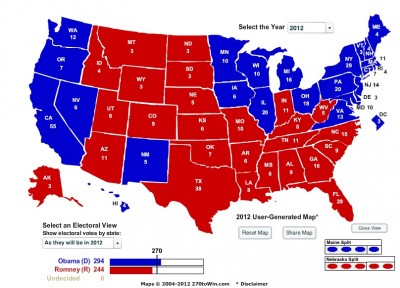
Ohio [18] Bellwether Ohio has been trending towards Obama, buoyed by a recovery and relatively low unemployment. The populist vote indebted to the auto bailout. The rural vote may make things close for Mitt Romney if turnout in Cleveland and the urban manufacturing centers falters.
New Hampshire [4] I think New Hampshire might be really close, but I think it’s leaning Obama. Romney was making headway in October, but it looks like his momentum has stalled. My concerns after following Canadian politics is the polls being off, particularly in constituencies with a rural composition. I wouldn’t be surprised if Romney pulls this out.
Virginia [13] I think this is a true toss-up. I think the fate of the Commonwealth electorals resides in three northern swing counties. I think Romney’s protectionist stance on China might hurt him with selected educated suburbanites. I think if turnout is high in northern Virginia, Obama gets a slight edge, but I think it will be very close.
At the risk of sounding like I’m hedging, I see the opposite as a definite possibility, i.e., Romney sweeping these three. Although the data might support my above prediction, there is the danger that the polls are off. While Nate Silver correctly predicted 49 of 50 states in 2008, he missed Indiana. I called Indiana for Obama based on Karl Rove’s observation that Barack was doing well in the northwestern corner of the state near Hammond & Gary. That’s why I’m thinking the following 279-259 Romney win could happen. It would be something, but not likely, if there was a 269-269 tie. This could happen with Obama getting Colorado and an electoral in Nebraska, while losing New Hampshire, Virginia, and Ohio. The likely result of a tie: President Mitt with Joe as Veep.
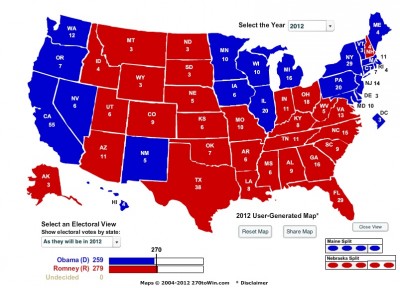
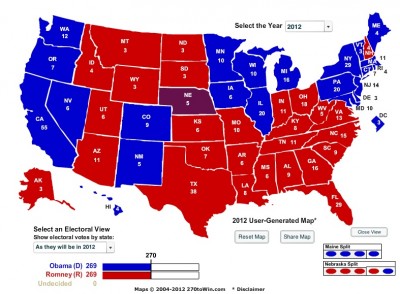
Note: Thanks to Fred Strauss for pointing me to this National Review post and several other sources that informed my opinion.

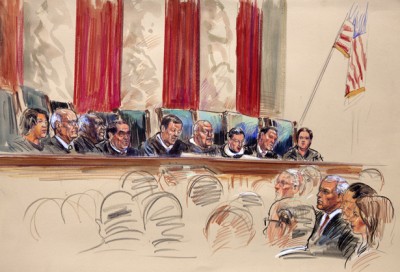
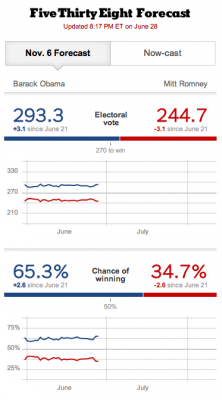
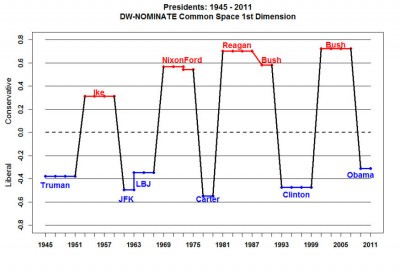



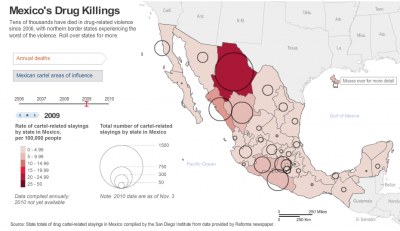
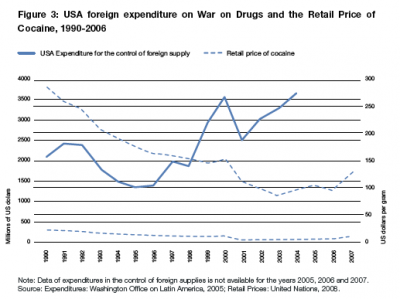


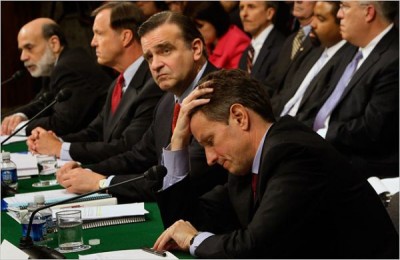
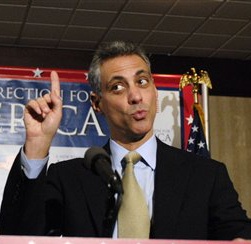
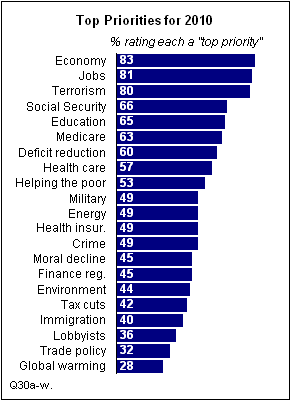 Terrorism is third, with the Christmas airline bombing attempt fresh in people’s minds. The next three are interesting with possible drivers:: social security {decimated retirement plans and obliterated pensions}, education {
Terrorism is third, with the Christmas airline bombing attempt fresh in people’s minds. The next three are interesting with possible drivers:: social security {decimated retirement plans and obliterated pensions}, education {